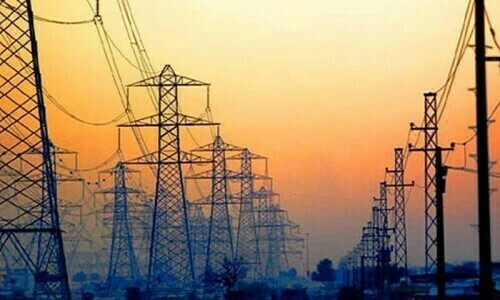EVEN though it is three months behind schedule, the newly established Central Power Purchasing Agency-Guarantee has started publishing payment details to fuel suppliers, generation companies and independent power producers.
The separation of CPPA-G from the National Transmission and Dispatch Company (NTDC) was one of the key requirements of the tripartite multilateral power sector reform programme supported by the IMF, the World Bank and the Asian Development Bank.
The CPPA-G will be an independent company and will be settling electricity dues for buyers and sellers. It is imperative to separate the functions and business of settlement and development of a competitive power market structure from the generation, transmission and distribution systems.
The move is a major reform to achieve efficiency through a transparent settlement of power sector dues and build industry standards to manage the sector.
The CPPA-G will be an independent company and will be settling electricity dues for buyers and sellers
This is viewed as a big step towards achieving transparent financial flows in the power sector, which has been one of the major drains on the national budget and consumer pockets. It is also aimed at checking the fresh build-up in the circular debt stock, which currently stands at Rs620bn.
The power-sector reform programme has been struggling for over two decades and its biggest contribution so far has been limited to increasing the number of companies and staff. The root causes of the problem — generation, transmission, distribution and other technical losses and the poor recovery rate — have remained unaddressed.
A legal hitch to the operationalisation of the CPPA-G — which is ultimately required to act as a stock exchange for the power sector — was partially removed recently when Nepra modified the NTDC’s licence to hand over its electricity-market functions to the CPPA-G.
However, even Nepra has not conclusively addressed the concerns of around two dozen IPPs regarding the alleged infringement of their contractual rights and obligations. But the regulator has assured the IPPs that their rights and obligations related to sovereign guarantees will remain protected.
Separately, it will initiate proceedings to safeguard the existing rights of all stakeholders through market rules and the commercial code of the CPPA-G.
The IPPs have questioned the new market structure and the licence conditions. The business of 22 IPPs was governed by their power purchase agreements (PPAs) with the NTDC and these were secured by sovereign guarantees for the entire period of the contract, spanning 30 or so years. Any change without the consent of the generation companies and the IPPs in the existing arrangement is a matter of concern for them.
It has also been argued that the CPPA-G does not have the comparable assets and financial strength to be considered sufficiently creditworthy to justify its assuming the substantial payment obligations under the PPAs.
And Nepra, while granting licenses to the IPPs under the 1994 power policy, added additional terms in these licences whereby it was clearly provided that the rules were applicable to the licensee without any impairment of its rights under the power purchase and implementation agreements backed by sovereign guarantees.
Moreover, as per the generation licences, the generation companies (gencos) have the option to participate in the development of a competitive trading arrangement.
The proposed arrangement is a step towards this, and in view of their generation licences, the gencos are not obligated to participate in the recent changes but have the option of continuing with the current structure as provided in their PPAs.
The IPPs are also opposed to the new settlement and billing procedures under the commercial code, which they claim are in contravention with their PPAs. Further, they seek clarity on the proposed arrangement of settlement and billing during the interim period before their novated PPAs are executed.
They say a priority payment list has been introduced whereby the payment of capacity invoices and delayed payment invoices will be given least preferences. And considering the cash shortfalls and circular debt, there will be no payment to IPPs under this head.
The IPPs consider this priority payment against the provisions of their PPAs, which state that all invoices shall be paid on a first in first out (fifo) basis.
Nepra has conceded that the long-term PPAs are the norm of the electricity business and that the sovereign guarantees are meant for this purpose. It has tried to assure the companies that it had dealt with a similar situation in 2003 when it issued generation licences to 12 IPPs who had entered into PPAs backed by guarantees before the commencement of the Nepra Act.
The regulator has also given an undertaking to the IPPs that their rights and obligations under their existing agreements would be protected under the market rules and the commercial code of the CPPA-G. Also, till such time that their PPAs are novated with the CPPA-G, the management of their billing and settlement functions and all other obligations will continue under their existing PPAs.
The regulator has also clarified that given the binding nature of the agreements and the implications of sovereign guarantees, the IPPs will not be required to participate in the competitive trading arrangements, which will remain limited to distributors for the time being.
Published in Dawn, Economic & Business, September 7th, 2015
On a mobile phone? Get the Dawn Mobile App: Apple Store | Google Play









































